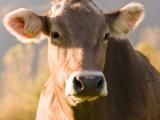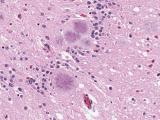Mar 13, 2006 (CIDRAP News) – An Alabama cow has tested positive for bovine spongiform encephalopathy (BSE), Chief Veterinary Officer John Clifford of the US Department of Agriculture (USDA) announced today.
The nonambulatory animal was euthanized by a local private veterinarian; samples tested by means of rapid screening showed inconclusive results on Mar 10. Per current protocol, samples were then sent to the National Veterinary Laboratories in Ames, Iowa, for further testing. The carcass was buried on the farm and did not enter the animal or human food chains, Clifford said.
A Western blot test showed positive results today. Results of an immunohistochemistry (IHC) test were not yet available but will be made public later in the week. If either the Western blot or IHC results are positive, the USDA considers the case confirmed.
The animal's exact age is not known, according to a USDA press release, but based on dentition, it was an older animal—"quite possibly upwards of 10 years of age," Clifford said. An animal of that age would have been born prior to the Food and Drug Administration's (FDA's) 1997 ban on feeding ruminants with feed containing ruminant protein. BSE is widely accepted as being passed from animal to animal through feed contaminated with such protein.
The USDA is working with Alabama animal health officials to determine the cow's birth cohort and to test any offspring. The epidemiologic investigation will also involve the FDA in determining the feed history of the cow.
Clifford assured in his announcement that "We will continue to be very transparent in sharing information with the public and with our trading partners around the world."
The current BSE case is the third in a US cow. One of the previous two infected cattle was born in Canada; the origin of the current case is not yet known.
See also:
Mar 13 USDA press release

















